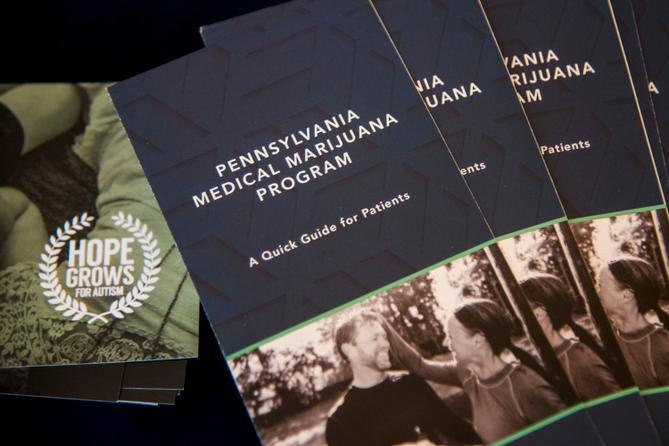Spotlight PA is an independent, nonpartisan newsroom powered by The Philadelphia Inquirer in partnership with PennLive/The Patriot-News, TribLIVE/Pittsburgh Tribune-Review, and WITF Public Media. Sign up for our free newsletters.
HARRISBURG — In 2018, the Wolf administration endorsed cannabis as a treatment for opioid use disorder, despite an absence of research and concerns from experts that it could give patients false hope — or actively harm them. A recent Spotlight PA story set out to measure the impact of that decision, three years later.
The implications are significant in a state with one of the highest drug overdose death rates in the country. Pennsylvania gives physicians wide discretion to recommend cannabis to patients with opioid use disorder if conventional treatments are ineffective or aren’t advisable, or if they are using cannabis to supplement conventional treatments.
The early reporting included what seemed like a simple request to the Department of Health: How many of the state’s roughly 550,000 registered cannabis patients were approved to use it to treat their opioid use disorder?
But the agency’s press office refused to give Spotlight PA the aggregate number, saying in an email that under the state’s medical marijuana law, “We cannot share specifics regarding patient use.” The department also denied a request for the information made under the state’s Right-to-Know Law.
The rejections were surprising, as the state has made such information publicly available in the past.
In August 2019, the director of the department’s Office of Medical Marijuana, John J. Collins, told members of the state’s Medical Marijuana Advisory Board that about 3,000 patients had been certified because of anxiety in the month after the state added it as a qualifying condition.
When asked about the apparent discrepancy, department spokesperson Maggi Barton did not explain or justify why the medical marijuana law allowed Collins to release that information, but the department couldn’t release aggregate data for opioid use disorder.
Instead, she said by email, “if a board member requests this information to be used to inform a decision it is prudent for the director to respond appropriately when requested by a board member.”
Meeting minutes provided by the department show board member Luke Shultz, a patient advocate from Berks County, asked Collins if the department saw an increase in the number of registered patients after approving anxiety as a condition. Shultz’s question wasn’t tied to a specific vote before the board, and he didn’t ask for a specific number of patients registered for anxiety.
Shultz also qualified the question by saying he wasn’t sure if Collins could answer, but Collins still provided a specific number.
There are other examples. In a February 2020 presentation made at a Medical Marijuana Advisory Board meeting, one of the slides said 3% of patients listed opioid use disorder as their primary medical condition, making it the sixth most popular choice.
And state officials have routinely provided the total number of patients in the program, including in an April 2021 news release celebrating the five-year anniversary. There were close to 553,000 patients and caregivers registered at the time.
In rejecting Spotlight PA’s request, the department’s open records officer, Lisa Keefer, wrote that all “information obtained by the department relating to patients, caregivers, and other applicants shall be confidential and not subject to public disclosure.”
After Spotlight PA appealed the denial, attorneys for the department said an employee could face a third-degree misdemeanor charge for “unlawful disclosure of this information.”
The department also cited confidentiality concerns when it rejected a request from CNHI reporter John Finnerty for records detailing the number of medical marijuana patients in each of the state’s 67 counties.
Finnerty appealed, and the state’s Office of Open Records on July 15 ruled against the department.
“Finding the requested aggregated data to be confidential would lead to an absurd result,” the office’s chief counsel, Kyle Applegate, wrote in the decision. “Under such a broad reading of confidentiality, information such as the total number of Pennsylvanians using the medical marijuana program would be confidential and disclosure of that figure could result in criminal sanctions. The OOR cannot conclude that this was the General Assembly’s intent.”
Spotlight PA expects a decision on its appeal in September.
WHILE YOU’RE HERE… If you learned something from this story, pay it forward and become a member of Spotlight PA so someone else can in the future at spotlightpa.org/donate. Spotlight PA is funded by foundations and readers like you who are committed to accountability journalism that gets results.

